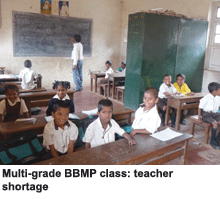 For 20,000 children enroled in the 137 Bruhat Bengaluru Mahanagar Palike (BBMP), i.e the municipal corporation, K-X schools spread across greater Bangalore (pop. 8.4 million), the new academic year which commenced on June 1 doesn’t look promising. Almost half (301) of the sanctioned 750 teaching posts are vacant, forcing students to attend multi-grade classrooms or manage without teachers at all. Although deputy mayor S. Harish had promised the vacancies would be filled by BBMP before the commencement of the new academic year, in an interview to The New Indian Express (June 16) he passed the buck to the BJP-ruled Karnataka state government. “We thought the corporation would handle this issue but the state government’s public instruction department has undertaken to appoint the teachers,” he says.
For 20,000 children enroled in the 137 Bruhat Bengaluru Mahanagar Palike (BBMP), i.e the municipal corporation, K-X schools spread across greater Bangalore (pop. 8.4 million), the new academic year which commenced on June 1 doesn’t look promising. Almost half (301) of the sanctioned 750 teaching posts are vacant, forcing students to attend multi-grade classrooms or manage without teachers at all. Although deputy mayor S. Harish had promised the vacancies would be filled by BBMP before the commencement of the new academic year, in an interview to The New Indian Express (June 16) he passed the buck to the BJP-ruled Karnataka state government. “We thought the corporation would handle this issue but the state government’s public instruction department has undertaken to appoint the teachers,” he says.
According to V. Ashok, additional commissioner (education), BBMP, the public instruction department has informed the corporation that it intends to fill up teacher vacancies through a common entrance test conducted by it. “The state government has approved filling up of the vacant 301 teaching posts. Now it’s up to the department of public instruction to conduct a common entrance exam to fill up the vacancies. New teachers will be appointed in a few months time. Till then, we have enough teachers to take care of academic duties,” says Ashok.
The indifference and lack of urgency to address the massive teachers’ shortage plaguing the city’s 137 free-of-charge BBMP schools, already crippled with abysmal infra-structure including lack of toilets and drinking water facilities, and offering vernacular medium (Kannada) instruction, has resulted in a consistent fall in academic standards and student learning outcomes. In the class X results announced in May by the state government’s State Secondary Leaving Certificate (SSLC) board, BBMP’s 33 secondary schools recorded a pass percentage of 55 cf. 75.38 percent in government schools and 84.88 percent in private unaided schools. Little wonder student enrolment in Kannada medium BBMP primaries in particular, is steadily falling with students voting with their feet in favour of private schools which guarantee better learning outcomes and offer English medium instruction. The majority of BBMP primaries sited on prime real estate in the city, host less than 100 class I-VII students.
Awareness that even low income households prefer, and are willing to pay for English medium education seems to be belatedly dawning upon BBMP officials. In November last year, the corporation, which has an annual education budget of Rs.40 crore, announced promotion of four English-medium K-X schools in the city. But since then nothing has been heard about them.
Against this backdrop of inertia and indifference in BBMP, which spends an estimated Rs.20,000 per child per year (equivalent to the tuition fees charged by some of the city’s top private schools), there is growing public demand for accountability, efficient utilisation of resources and public-private partnerships (PPPs). “BBMP corporators busy with petty politicking have little interest in improving corporation schools. The schools need to be assessed regularly, teachers given continuous training, and children extra help and attention. Obviously, the Rs.20,000 BBMP spends per child is not being efficiently deployed. In the interests of students, it’s best for the corporation to enter into public-private partnerships with NGOs and private trusts who will manage their schools within the sanctioned amount of Rs.20,000 per child per year,” advises Prof. A.S. Seetharamu, former professor of education at the Institute of Social and Economic Change, Bangalore and education advisor to the Karnataka government.
Fortunately, an initiative has been taken with the BBMP signing a PPP with the Mumbai-based Bharatiya Vidya Bhavan (BVB) to promote a CBSE-affiliated primary school at Srirampura, in suburban Bangalore. The school, which admitted its first batch of 160 students last month, will charge 50 percent of students tuition fees of Rs.8,000-9,000 per year, with the remainder given full fees waiver. Under the partnership BBMP provides land and infrastructure, while BVB is in charge of all academic matters including appointment and training of teachers.
Hopefully this PPP will pan out. Even if belatedly, for children from households at the bottom of the country’s iniquitous socio-economic pyramid, there’s a glimmer of hope.
Swati Roy (Bangalore)